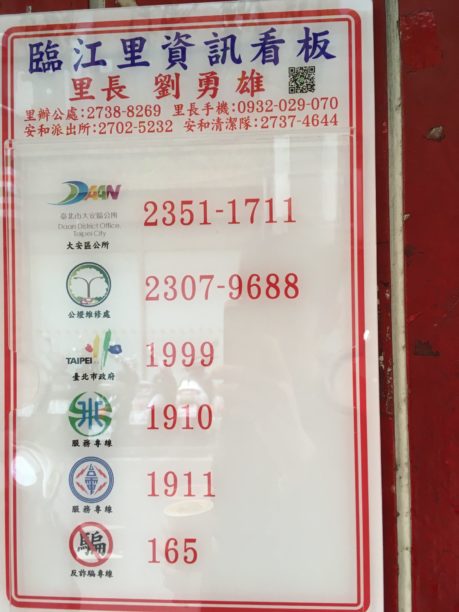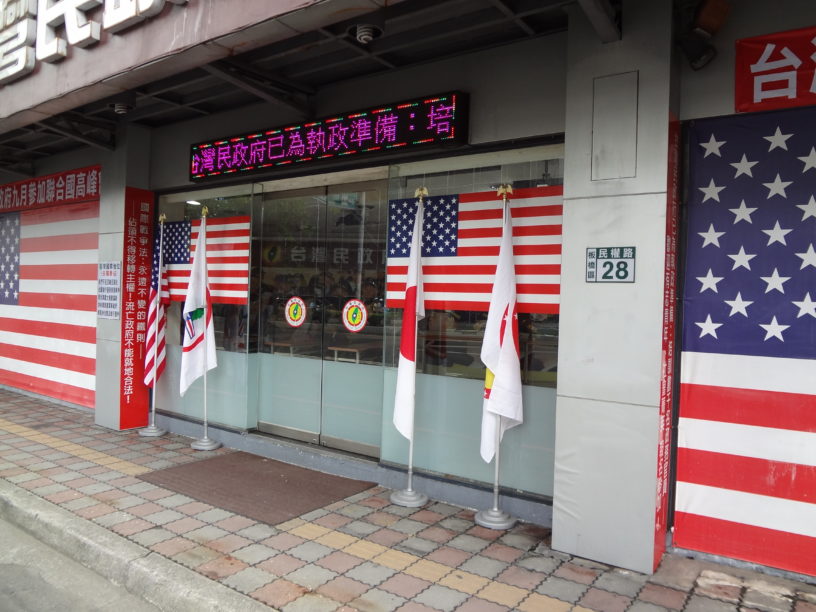Every day my Line account—Line being the main messenger app used in Taiwan—fills up with dozens of messages from spam accounts, usually trying to sell me knockoff designer goods. How these spam services got hold of my cell phone number, I don’t know. But cell phone scams of every description are rampant in Taiwan, to the point that the government has specific hotlines dedicated to reporting them, sometimes advertised alongside emergency services like police, firefighters, and 911.
Telephone scams in Taiwan follow familiar patterns seen in many other countries. Scammers pretend to be friends or relatives needing to borrow money under the pretext of some sob story, such as having been kidnapped and put up for ransom. Or they may pose as some figure of authority, such as the police, or a bank, just as in the States telephone scammers often pretend to be calling from the IRS.

Some scammers—including Taiwanese ones—operate outside the target country; a number of telephone scam rings have been busted outside of Taiwan.
This familiar kind of fraud depends on the victim’s credulity; their willingness to believe a made-up story. Elderly people are disproportionately the victims of telephone scams, maybe because they grew up trusting the voice on the other end of the line, and/or because modern technology has grown up so quickly around them that they are too overwhelmed by it to think critically. And yet it seems most people are overwhelmed, to some degree, by the sudden and vast changes in the world, technological or otherwise.
Telephone scams are a good place to begin in considering the broader exploitation of credulity in mass societies. There are a lot of groups with made-up stories out there now—religious, business, medical and self-help organizations, many of which have the vibe of telephone scams, in that they seem to exist solely for the sake of defrauding people. The government has, for the most part, taken little action to curb them.
In Taiwan a number of such groups are religious in nature. One infamous example is Rulaizong, a group led by the spiritual leader known as Miaochan. Miaochan was the object of much mockery on the Internet in 2017 after news broke that his followers were planning on buying him a Rolls-Royce for every day of the year. Miaochan is thought to have had an annual income of over 72 million NTD (around 2,400,000 USD), all donated by his followers. The organization runs dozens of student groups on college campuses across Taiwan, perhaps as many as 100.
Rulaizong spiritual leader Miaochan, dubbing him “DJ Seafood”. “Seafood” is a nickname acquired by Miaochan because of the similarities of its English pronunciation to the Chinese term “shifu” (師父), meaning “Master.”
Other quasi-religious groups such as Foguangshan and Tzu Chi own a great deal of property and other assets. Tzu Chi, for example, sponsors Chinese language schools in America, owns an entire university in Hualien on Taiwan’s east coast, and has developed a large medical care infrastructure that extends across all of Taiwan. Though they may be doing legitimately good work, both Tzu Chi and Foguangshan have been accused of acting more like businesses than like religious groups.
Given Taiwan’s longstanding ties with America, and that Chiang Kai-shek and the Kuomintang were propped up by America in order to oppose China under Mao, a number of similarly constituted American religious groups and cult organizations have also ended up in Taiwan. American Christian anti-gay groups such as Exodus International and MassResistance have funneled large sums into Taiwan over the past year in order to back Taiwanese Christian anti-gay groups, for example.
Scientology also has a substantial presence in Taiwan, particularly in the south. As elsewhere, the organization has a sketchy reputation in Taiwan. Just this past month in Australia, a Taiwanese man was murdered on the grounds of a Scientology property by a 16-year-old Taiwanese boy.
Apart from legislation pushed by progressive third parties, the government generally seems to have little appetite for curbing the already wide powers power of these organizations. Recent legislation even proposed allowing religious groups to purchase land if occupied for long enough, paving the way for seizures of land forcibly occupied by such groups. The same legislation could conceivably have allowed religious groups to deny the government oversight over their actions in the name of religious freedom. The ease of registering religious organizations in Taiwan has long been suspected of being a means of conducting money laundering.
As in other countries, there are business cults as well as religious ones. I once met a man at a bar who claimed to be a small business owner, who asked to meet with me a few days later. Having mentioned that I was the founding editor of an independent media outlet, I assumed he wanted to submit an article, or donate, possibly. It turned out that he wanted me to join an American direct sales cult called Melaleuca. They had an entire building in Songshan, in eastern Taipei, with framed pictures on the wall of those with the highest sales for each month. I was sort of insulted that he apparently thought I was enough of a dupe that he could convince me to join. How that organization, which has longstanding ties to the Republican Party, made its way into Taiwan, I have no idea.
The most fascinating cult organizations of all, however, may be the ones that directly concern themselves with Taiwan’s geopolitical status.
Every country, one suspects, has conspiracy theories founded on strange views of the law. For example there’s the sovereign citizen movement in America and Canada, who’ve got their own special category of citizenship, and the Reichsbürgerbewegung (Reich Citizens’ Movement) in Germany, who believe that Germany is still, legally speaking, the pre-World War I First Reich. Confusion and fear of the law, which looms overhead for most as this unknowable force which can nonetheless dictate the entirety of one’s fate, produce fertile ground for spawning such theories.

Given Taiwan’s complicated geopolitical status, in which China claims Taiwan, though Taiwan is a former colony of Japan, and the official legal status of Taiwan remains in limbo all over the world, there’s enough confusion to promote the claims that Taiwan is secretly a part of either Japan, or the United States. With respect to Japan, the theory is that Taiwan remains a part of the Japanese empire, though the Japanese empire ceased to exist after World War II. The US-based conspiracy theory is that Taiwan is secretly America’s 51st state (not to be confused with the claim that Taiwan should become America’s 51st state, which other groups advocate, but that it already is). Groups that make such claims include the scandal-ridden Taiwan Civil Government—though I can’t actually quite understand if they believe Taiwan to be part of the United States or Japan—or Club 51, which also claims that Taiwan is part of America.
I learned about these bizarre theories when someone in my favorite bar, after hearing that I grew up in America, leaned over to me conspiratorially and said: “Tell me. Is it really true… that we’re really America’s 51st state?” An example of the tendency of many in Taiwan to see America as Taiwan’s savior from China—expressed in the form of a conspiracy theory.
Although the Taiwan Civil Government’s leaders got into hot water for defrauding their members, it’s difficult to know whether or not they believe their own claims, on some level. Apart from the fact that they bombard me with e-mails constantly—whenever I block them, they always seem to have more accounts to e-mail me from, like a hydra—I see them posting constantly on social media, wildly talking up their own importance, asserting that they secretly have the ear of the US government.
People want to believe in some grand, overarching secret truth about the world, perhaps, and they join cults because they want to feel closer to that secret truth, or maybe they simply are lonely and isolated and therefore easily deluded. The lack of coherent truth, connection and trust in the world makes the lonely all too easy prey for scammers; the increasing sense of alienation seems to be at the root of it.






